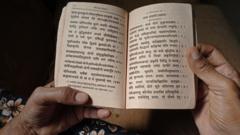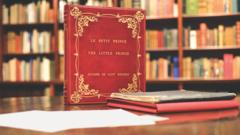Recent analysis unveils a historical letter that contradicts well-held beliefs regarding William Shakespeare's relationship with his wife, suggesting a more complex marriage than previously thought.
Revisiting Shakespeare: New Findings Challenge Perception of His Marriage

Revisiting Shakespeare: New Findings Challenge Perception of His Marriage
Groundbreaking research reinterprets Shakespeare's relationship with his wife by analyzing newly uncovered evidence.
In a fresh turn of events, a neglected letter fragment has sparked new interest in the marital life of William Shakespeare, challenging the long-standing notion that he was a neglectful husband. The document, addressing “Mrs Shakspaire,” was discovered in the binding of a 1608 publication and has remained largely overlooked since its initial mention in 1978 by a history enthusiast.
Traditionally, Shakespeare’s marriage to Anne Hathaway—arranged when he was just 18 and she was pregnant—has been viewed through a lens of disappointment. Many scholars have posited that Shakespeare distanced himself from domestic life as he pursued a career in London, with some critics labeling Anne as merely a "distant encumbrance." This stereotype has been reinforced by Shakespeare's will, which famously left Anne his “second best bed,” interpreted as a sign of his indifference.
However, Matthew Steggle, a literature professor at the University of Bristol, suggests a corrective interpretation of this narrative. His forthcoming research taps into modern technological methods that facilitated the identification of individuals mentioned in the historic correspondence and the evidence that it likely involved Shakespeare's wife.
Steggle had been compiling a biography of Shakespeare when he stumbled upon the overlooked letter. He expressed astonishment that such a vital piece of evidence could slip under the radar for so long, despite the potential it has to reshape our understanding of the Bard's personal life. The letter's possible implications could lead to a re-evaluation of not just Shakespeare's marriage but his identity as a whole, inviting academics and enthusiasts alike to reconsider the depth and complexity of his relationships beyond the literary canon.












